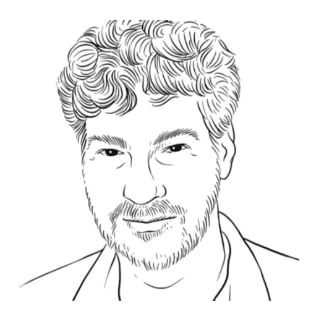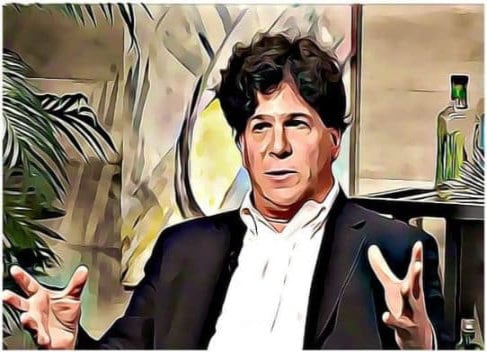evolutionary theory
August 2019
Rather than us provide an elaborate intro, it's best for you to dive right into the thread covering Bret's insights on a topic fundamental to our life on planet earth.

Dr. Bret Weinstein Evolutionary Biologist
1/ "The enemy that has no name is not a nation, organization or a religion. It is not a corporation, industry, economic system or an ideology. It is a way of living on the earth that evolved.
If we are to change it, we must take evolution from autopilot, and into our own hands. We must come together to create the future we wish to inhabit."
Let's do a Bret Weinstein 101.
2/ The credit for initiating this goes to my partner. Her level of determination over many months to listen to, transcribe, study and organize Bret's words has been extraordinary!
The resources attached at the end of the thread will put this into perspective.
3/ So Bret has this gift, where he adds the missing piece in a conversation to beautifully tie things together.
This thread is about many such pieces. It explores our world through the powerful lens of Evolutionary Thinking, to help humanity move in a better direction.
4/ The challenge in putting this together has been about what to include/ leave out, at the risk of diluting nuance. So key points within topics below, should be used less as a summary, and more as a cue to explore context further.
Enjoy!
5/ The Early Years:
When I was a little, my grandparents Harry and Sophie Rubin took me on a hike in Griffith Park in the hills above LA.
As we sat eating our lunch, my grandfather handed me a magnifying glass and pointed me to the center of a flower.
6/ As I looked at all the levels of intricate structure, the two of them told me about Darwin, and how all the complexity that I saw was a consequence of a simple thing called Selection.
When I looked up, I was not the same again.
7/ At School:
I wasn't a good student. In 2nd grade my handwriting and spelling were so bad I remember school giving up on me.
I felt a choice to submit stuff and be dismissed as dumb, or to stop playing ball. I did (the latter) and it caused my academic life to come apart.
8/ Learning how to think without school was primarily from my grandfather, brother, and other people in my environment who weren't associated with school.
I became a Professor because I loved Science. Not because I wanted to be a teacher.
9/ Bad students don't typically become Professors. So when someone (like me) says to the students: 'I know being a bad student isn't synonymous with you not having potential', thats empowering.
Almost nobody on the (Evergreen College) faculty had a clue why bad students are the way they are.
10/ All people are born with minds that natively do science. Modern schooling drives out that impulse by penalizing the asking of certain kinds of questions.
My favorite students often came through the door thinking they're not scientifically minded.
11/ Science requires faith:
In order to engage in science one must at the very least assume that observing the universe is actually possible.
If you are a computer program designed to imagine it is a human, or if you are the subject of an alien experiment in which
12/ the inputs to your brain are being fed everything you perceive as reality, then you can't do any science.
So you begin with the unfalsifiable assumption — the faith — that you are a rational human with the ability to perceive a law-like, patterned universe.
13/ Why study Evolution?
All the things people care about, find fun to do, pursuits driving them, their loves, passions, are all products of evolution. This means understanding evolution can provide a kind of roadmap against the inner confusion.
That's a very powerful incentive.
14/ It's a powerful advantage to understand ourselves at this level and why people interact in the way they do. This is because it has relevance to how we behave.
But evolutionary biology, especially as it approaches humans, is in no way politically correct. This is not a safe space.
More
15/ Adaptive Evolution
We think of evolution as about the past, but adaptive evolution occurs because it prepares creatures to deal with future environments.
The past can't be changed. The future is where ones profits can b enhanced and cost reduced, so thats what evolution is about.
16/ We are, like all creatures, the product of Adaptive Evolution. But we're also highly unusual among evolved creatures.
What makes us different from the most similar creatures is something I call the 'Omega Principal'. It specifies the relationship between Human Genome and Culture.
17/ Now a tremendous amount of what we are, is not housed in our genomes. It is housed in a cultural layer that is passed on outside of genes.
Culture is vastly more flexible, plastic, and quickly evolving in an adaptive sense than genes.
18/ It allows us to switch what we're doing, and how we're doing it, much more quicker than if all the info that was adapting, was stored in DNA.
It's especially important with complex phenomenon (e.g. language) which may be partially housed in the genome and partially in the cultural layer.
19/ Relationship of Culture to Genes:
Evolutionary biology hasn't yet done a good job of explaining this. My claim is, culture is every bit as biological and evolutionary as genes.
Genes, and the cultural traits they make possible, are overwhelmingly aligned in their objective.
20/ But our culture is subordinate to our genomes — in terms of objectives it has to serve.
Subjugation of culture to our genomes interests, pits us against each other in an unhealthy way under the best of circumstances, and downright lethal with the tech we have at our disposal.
21/ What our genes want is not fully defensible. Much of its abhorrent. The genetic mission is propagation of our particular genetic spellings.
The mindfuck is that the entire evolutionary story is the cosmic spelling bee and it ends in genocide.
22/ e.g. If I have a gene for particularrespiratory enzyme and someone has a 20% more efficient gene, my genes will seek to displace and drive to extinction that superior gene so that it may spread.
The ability to dehumanize other people so as to justify treating them inhumanely is built-in.
23/ This should give us a clue: Something about this landscape isn't simply about progress. It's about progress in a very narrow sense, and it's quite dangerous.
It's up to us to recognize the objective of the entire program is not honorable. In a sense, we have to take our genomes out of the drivers seat.
24/ We've been handed — the living generations have been handed — the greatest project of all time.
It's the most rewarding, and the most heroic, because evolution has awarded us the capacity to evaluate our purpose, and reject it.
25/ But we have to figure out how to do this in a way that doesn't suddenly put us at a disadvantage, relative to people who don't decide to put away the evolutionary objective.
If not, those who refuse to come along will inherit the earth and keep going down a self destructive path.
26/ On Dawkins and Religion
In 1976, a 35 yr old Dawkins wrote The Selfish Gene. He introduced the concept of ‘meme’. His cultural analogue for gene.
A meme is a unit of cultural evolution— not stored in the genome but evolving outside of it. But there was an error.
27/ The error is a misportrayal of the relationship between Culture, its units of evolution (Memes) and Genes, and the way they evolve.
To Dawkins memes evolve as if in a new primeval soup, suggesting independence of memetic products and genetic underpinnings of our physical nature.
28/ To him religion is a mind virus: A meme replicating itself without regard to truth or falsehood.
My point is, you are only able to pick up units of cultural evolution (memes) because your genes created a brain hospitable to them. Cultural traits are obligated to serve genetic interests.
29/ If culture starts wasting your genes resources, your genes are in a position to shut it down.
In this context, religion as a 'mind virus' makes no sense. Having existed thousands of years they can't be mind viruses. They're compendiums of a kind of wisdom — non literal wisdom.
30/ New Atheists are unable to see this kind of value. They're unable to see a pragmatic value of these belief systems, because they're too caught up in evaluating the claims tied up in these texts.
The falseness of the literal claim obscures the value of belief in that claim.
31/ Memes are Extended Phenotype:
The ultimate way to understand religion is just the same way to understand beaver ponds.
They're extended phenotypes of the creature who's mind they run — memes employed by the creature to preserve food, territorial strategies, etc.
32/ To me it looks like a lineage handing down a belief system resulting in it being ecologically effective at preserving itself.
Memes should not be analyzed on their own, but as serving the interests of the underlying genome, i.e., ponds serve interests of the Beaver genome.
33/ Religion passes the Adaptive Test:
It's complex, it's expensive, theres variance in how much the creature spends on it, and it lasts over evolutionary time.
In the 4-part adaptation test I came up with, if all 4 (above) criteria are met, you are logically justified in assuming that
34/ adaptive evolution is the explanation, unless countervailing evidence arises. The purpose of the test is so we can move on to more interesting questions: What is the value of this thing to the creature?
Thats where interesting stuff in evolutionary biology actually happens.
35/ Metaphorical Truth:
I call it the state of being literally false and metaphorically true.
A belief is literally false and metaphorically true if it's not factual, but behaving as if it were factual results in an enhancement of one's fitness.
36/ For example, if one behaves in the Christian tradition so as to gain access to heaven, one might not actually find themselves at the entrance of pearly gates.
But one does place his descendants in a good position with regard to. the community those descendants continue to live in.
37/ If we are to think evolutionarily, the person behaving as if to get into heaven has genetic interests — represented in the narrow sense by immediate descendants and close relatives, and in a larger sense, represented by the entire population of people from whom the individual came.
38/ By acting so as to get into heaven the fitness of that person (number of copies of those genes that continued to flourish in the aftermath of the persons death) will go up.
Lots of concepts are useful, even if inaccurate, by leading you into a kind of behavior that's advantageous.
39/ Population, Intelligence, Heritability:
If differences between populations with regard to cognitive capacity are major rather than minor, then we have a terrible new problem on our hands.
But we can't be sure about them because we haven't gotten sophisticated enough to detect them.
40/ Heres the crux of the matter. This is a place where evolutionary biology hasn't really delivered in terms of tools, to adequately and meaningfully have the conversation.
Problem is with the term 'heritability'. It's a term that has changed its meaning.
41/ When Darwin talked about heritable traits he was talking generally about anything inherited from one generation to next.
When geneticists discovered the mechanism where DNA encodes protein through triplet codeons, the story was so elegant people said 'it's the mechanism of Darwinism'.
42/ Its not. It's 'a' mechanism of Darwinism.
We've been suffering from outgrowth of having formally redefined 'heritability' around that particular mechanism, which doesn't even account for the majority of the genome.
43/ Less than 5% of the genome functions this way. The rest of it we've been treating as unimportant. But it isn't. We just don't understand it.
Heres the paradox we need to wrestle with:
44/ Say theres a phenotypic trait people can see on one surface, e.g. broad noses. Lets say the notion spreads that broad noses go along with sub-average intelligence.
Then people with broad noses go out into a world in which the expectation is this person with a broad nose is likely to have lower intelligence, resulting in a less enriching world— a world in which
45/ when such a person accomplishes something, it's less likely to be recognized.
The problem is, when we measure heritability, we'll actually discover there is a heritable difference in intelligence. It's not wrong. Theres a difference.
Why? Because it functions through people's expectations in the world based on a
46/ phenotypic trait that has nothing to do with the way the brain is structured.
When people hear heritable they think: Blueprint. Genes. Brain. It's not how our genomes work and certainly not how our brains work. If I tell you theres a heritable genetic difference in average
47/ cognitive capacity between population A and B, you just heard immutable — in the genes.
When a geneticist says heritable they think in very narrow terms that you'd find it absurd if we unpacked it here.
If we think a heart must be heritable, it's not. Why? Because we all have one.
48/ If everyone has a trait its heritability drops to 0.
Heritability is defined as that fraction of the variance thats due to genes. If theres no variance in having a heart theres no heritability.
Something weird going on with the term. It doesn't mean what you think it means.
49/ The Blank-est Slate:
Seeing human beings as a blank slate is a sucker's bet. We are not blank slates.
But we are the "blank-est" slates to have existed on this planet compared to any other creature. The most recent phase of our evolution involved getting blanker than we were.
50/ The human brain is the least prewired to any brain thats ever existed on earth.
Our genomes built a brain capable of having, what amounts to software, loaded on after birth at much higher rates than other creatures.
51/ It's most responsive to early experience, culture, or direct learning. It's why our childhoods are longer than other creatures.
It is only possible to have the diversity of behaviors (including abstract thought) because the software is auto programming after birth, rather than being a direct product of things written into our genomes.
52/ Humans are by far the most nurture based creature to ever have existed on this planet. We've been pushed in the last phase of our evolution very far into the direction of nurture.
This isn't an accident. It occurred because it provided a distinct evolutionary advantage.
53/ Synthesis vs Reductionism:
In science, synthesis is the opposite of reductionism.
A reductionist research program isolates components of a system to understand their individual contributions.
54/ Synthesis by contrast collects isolated facts, observations, patterns — arranging and juxtaposing to reveal emergent relationships.
These connections originate in science as hypotheses, which make predictions, allowing us to determine if emergent picture contains novel insight
55/ When insights stand up to testing they become theories.
If we loosen the reins on this structure a bit, to make this applicable outside of formal science, a collection enters the realm of a synthesis when it has emergent properties — characteristics exceeding the sum of components individual properties.
56/ Guns, Germs and Steel and The Selfish Gene are great examples of scientific synthesis.
Biggest bang for society's buck has always come from collection of data guided by robust and lively theoretical map. Synthesis is becoming a lost art in sciences.
57/ It's too risky for young academics. A safe way to build a career is collecting useful data others aren't also working to collect.
This tends towards reductionism — done increasingly without careful attention to theoretical context and sometimes without any hypothesis at all.
58/ The Power of Intuition:
The cleverest scientists in my field, and my guess is in every field, are ones with really good intuition.
We tend to think they are the ones with the the highest horsepower brains, but I just don't think this is right.
59/ It's the ones who know how to allocate their attention in order to spot what others haven't seen, or they know the sound of an appealing fiction
.If you know what an appealing fiction sounds like, theres a good chance those appealing fictions may have become the assumptions that support someones wrong model.
60/ So you do something else that distinguishes you in some way.
There were things in Evolutionary biology that were were big, unanswered, and nobody really knew which direction to go in — it sort of seemed like they were intractable.
61/ I developed a toolkit for figuring out how to approach those puzzles with enough naïveté, so as to not make the same mistakes as the people for whom they were intractable.
It became tremendous amount of fun! The eureka moments are almost a giddy childish feeling. It's marvelous!
62/ Explorer Modes:
One of the most important unanswered questions in evolutionary biology is, where the power of evolution comes from?
We teach about random mutations being mostly bad, occasionally good. Good ones get favored, they accumulate, and that's what makes our forms so effective.
63/ The flaw in it surrounds the question: how do mutations alter the morphology of one creature so it can take on a different ecological role?
My answer to this involves 'Explorer modes'. These are mechanisms through which an evolved clade — a set of creatures — explores design space so it can discover opportunities it would not find by accident.
64/ Occasional accident would result in the fish swimming into a watershed it wasn't born in, finding a mate and producing offspring.
Or you could have exploration of adjacent watersheds in which, creatures that exist in one watershed have some chance of finding the next watershed over. To check to see whether theres an opportunity in it.
65/ When we look at the actual behavior of salmon and we see the small number of individuals do not return to the stream they were born in.
Instead of saying this is an accident, what we ought to say it's a high expected value gamble.
66/The creature making so called ‘error’ actually has an advantage, because it may end up producing a thousand surviving offspring.
High-risk, high-reward activities are often viable.
67/ Even though if we monitor the average individual who makes this choice, it can appear near suicidal.
We have a creative capacity to search for opportunities nearby, hypothesize about how they might be exploited, and then test those hypotheses and refine some answer.
68/ Extraordinary Capacity:
I don't like arrogant people any more than the next person, but I often think that those who are dismissed as arrogant, aren't really arrogant.
What they are is ambitious — ambitious in the sense of trying to discover what might be possible.
69/ I don't want to get in that persons way. I don't want to imagine I understand more about their process of discovering something new.
I understand my process to an extent, but I'm inclined to give somebody who might have extraordinary capacity room,
70/ to go about doing what they do in some way that may not make sense to me. I'm interested in seeing what they can accomplish, and we're all enhanced if they accomplish something good.
I must say I have a pet peeve about a system that just sort of generically encourages people
71/ to say out loud that they don't believe in themselves above some relatively common level. Thats just a mistake.
If you're constantly reviewing whether or not it would sound arrogant to even discuss such an idea, then you're self sabotaging.
72/ Senescence:
What we typically refer to as ageing: the tendency of creatures to become less efficient and more vulnerable with age.
The genes in our genome have to do multiple jobs.
73/ There aren't simply enough of them to do all of work necessary to make a self-assembling 30 trillion cell, self maintaining organism like us.
So it's necessarily true that genes will tend to do more than one thing. A gene that has multiple functions is called a pleiotropic.
74/ A key insight from George Williams was pleiotropic effects would often pull in different directions, and for any gene where the benefit came early in life, and the harm came late in life, selection tended to favor the gene in spite of the harm.
The reason is, late life effect of
75/ that gene won't be experienced by nearly as many people as the early life benefit (of the gene), because many people won't survive to experience it.
The later in life the negative effect happens, the less selection is capable of purging it from our genomes.
76/ This results in gens that have early life benefits and late life harms accumulating in our genomes.
It creates a tendency to degrade our function over time, beginning not at birth but at the usual moment at which individuals in that species begin reproducing.
77/ So is there a cultural analog to this process, driven by selection for early life benefits despite of late life costs?
Unfortunately, yes. Our economic, political systems are tailor-made to bring it about. We are seeing a kind of senescence unfold before our eyes.
78/ Economics & Politics:
The natural tendency for a creature that found its way into a niche is to protect its access to it by freezing other creatures out.
In the market we have feedback loops that interact. Wealth thats made in the market is capable of increasing one's
79/ power over regulation. In turn allowing increased opportunity to make money in the market.
This is a positive feedback loop which should scare any engineer or biologist, because positive feedback loops that are not bounded by some negative feedback force are unstable.
80/ This feedback loop has re-engineered our system cryptically, and turned it into an engine for the concentration of wealth and power.
It has installed an unelected group of very powerful and wealthy people, who effective veto power over any attempt to change from the status quo.
81/ We also see ideas that work in the short-term, but fail and cause vulnerability in the long term. These tend to survive in our system as they tend to produce economic benefits.
If you engage in the production of some tech that produces benefits
82/ for humanity over the course of several decades, and the harm of that tech manifests over later decades, you will have become wealthy in the short term.
By the time you get around to discovering the costs in the long term it has found its way into the political system so it can't be reversed.
83/ You can't have a system where you can't reverse things.
This system will therefore drive off the cliff rather than recognize that something at its core was awry and leading us into danger.
84/ Game A & B:
When I say 'game theory' people give strange reactions like I'm trivializing the issue. So we need to rename it or get over the stigma.
The term 'game' in the situation is about complex systems in which theres competition, in which theres winning and losing.
85/ It describes living biological systems, economic, political systems. It's at the core of all things we are trying to sort out.
There's 4 or 5 fundamental games that change the way you see almost all human interaction. By understanding those you effectively harness the power of
86/ evolution to build a functional system, rather than build a system, and then suffer consequences of evolution that you didn't anticipate.
But that's what we keep doing. We've built an economy and a political system that evolved out from under us and they create monstrous phenomena
87/ that we didn't anticipate, because they weren't in the plan.
Game A is the market as we find it. The winners in this game theoretic landscape are individuals who have figured out where there is a niche, and then protecting it by freezing others out.
88/ Game B is the idea that one needs to create an entity that is capable of (functioning in) competing in game A’s terms and winning against game A.
Bitcoin, is an example of a game B.
89/ Speak of the Devil:
There are really two ways in which cooperation evolves.
The first is very ancient. It is based on genetic relatedness and it's hard to give it a starting point, but it literally goes back billions of years.
90/ The 2nd is based on various kinds of reciprocity. It's much newer and much more fragile.
The problem stems from the fact that when reciprocity based cooperation breaks down, we default to gene based cooperation.
91/ Look at it in the context of intersectionality, which has captured the attention of the far left. Cooperation, game theoretically, is likely to break down amongst the intersectionalists.
At the same time, the people who they've backed against the wall, together have a second basis
92/ for cooperation — its genetic cooperation and much more durable.
Intersectionalists may end up creating the very enemy they claim to be fighting. And 'speak of the devil', white nationalism will emerge from that cohort backed against the wall.
93/ When it does, those people will feel empowered and self-righteous, because they've been accused of things that are a form of bigotry.
This is extremely dangerous. History tells us movements created by such people can be very destructive – ultimately may turn into a genocidal menace.
94/ Shared Frontier:
If we continue down our current path we won't survive. We consume too much, our tech is too powerful, and we are all hooked together in one global system.
We'll thrive or perish together. All the problems we face are actually symptoms of a process with no name.
95/ But theres a way out: An achievable goal if we accept a few things:
1. Given similar circumstances people are basically alike.
2. An excellent world is possible but perfection isn't an option
3. The future can not be designed, it has to be discovered.
It's not magical thinking.
96/ It's a logical conclusion of inquiry. It's in a very real sense the final frontier for humanity. There's no guarantee that we'll succeed, but we must do everything in our power, as failure will surely lead to extinction.
We must come together to create the future we wish to inhabit.
97/ 'Professor in Exile':
The benefit of it is that I get to have conversations like this.
I won't say that is all I will continue to do, but to the extent I can raise awareness of the power of evolutionary thinking, and its implications for human well-being, it's a good use of my time.
98/ Also see:
How we taught at Evergreen
The Racist Gene
Sex & Gender
The Fourth Frontier
Mentors & Important People
98/
ALL Topics
ALL Transcripts, Video links, Paper Definitions & Explanations
100/ Thnx for in-depth chats @RubinReport @joerogan @GadSaad @jollyswagmenpod @wethefifth @BenjaminABoyce @WisdomRebel @peternlimberg @VirtualFutures @JulianWasHere
Especially @HeatherEHeying — a brilliant evolutionary biologist and courageous person in her own right. A wonderful writer too!
101/ Finally, thanks to Bret Weinstein for his unique insights, and to my partner for her single minded dedication in wanting to bring this to life! She wishes that she had a teacher like Bret in school.
Well, that's it for this Bret Weinstein 101. Thanks for reading. 🙂
ADDENDUM: At the time this thread was released, a vital aspect of Bret's prior work on the topic of 'Telomeres & Laboratory Mice' had not fully seen the light of day. It was explained in this podcast. There's more on the subject here.

















